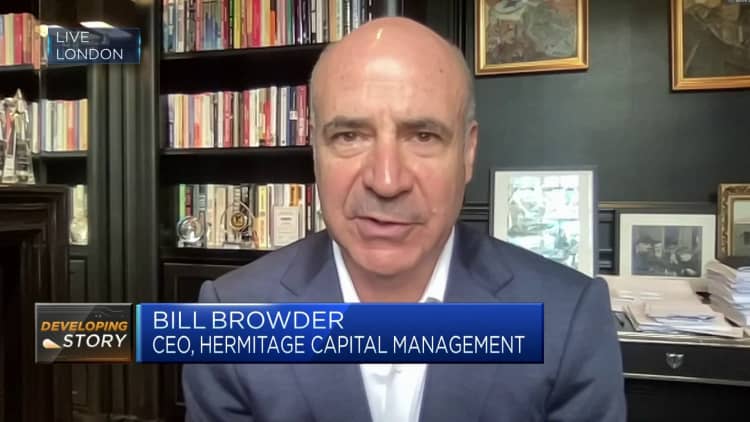A Ukrainian police officer walks past a 24-storey building partially destroyed following a Russian missiles strike in Kyiv early on June 24, 2023.
Sergei Supinsky | Afp | Getty Images
Ukrainian forces can look to take advantage of the Wagner Group’s short-lived armed rebellion, analysts said, with confusion among Russia’s military leadership expected to considerably weaken their war effort.
A weekend of mayhem has left observers of Russia’s full-scale invasion of Ukraine questioning what could happen next. The extraordinary 24-hour period posed what many regard as the greatest challenge to Russian President Vladimir Putin’s grip on power in his more-than two decades of rule.
Yevgeny Prigozhin, the notorious boss of the Wagner private militia group, launched an apparent insurrection over the weekend, sending an armored convoy toward the Russian capital.
The rebellion was abruptly called off late Saturday, however, in a deal brokered by Belarusian President Alexander Lukashenko. Prigozhin agreed to de-escalate the situation and ordered his fighters advancing on Moscow to return to their bases.
John Barranco, the 2021-2022 senior U.S. Marine Corps fellow at the Atlantic Council’s Scowcroft Center for Strategy and Security, said the Wagner rebellion could not have come at a better time for Ukraine.
“Whatever Prigozhin’s real motivations are, or the outcome of his revolt and then apparent about-face, a few things remain clear: Massive amounts of confusion have been sown in Russia’s rear area, and whatever confidence rank and file Russian soldiers had left in their leadership is gone,” he said in a blog post.
A spokesperson for Russia’s foreign ministry was not immediately available to comment when contacted by CNBC.
A war without Wagner
Barranco said that once an army loses confidence in its leadership, morale falls through the floor — and the will to fight often goes with it.
Describing Wagner as what had been Russia’s most effective unit in Ukraine, Barranco said the mercenary group will almost certainly be disbanded and it was not yet clear whether its fighters will be absorbed into the Russian army.
Tony Brenton, former British ambassador to Russia, agreed that the Wagner mercenary group had been the most effective component of Russia’s military in Ukraine to date.
“The fact that, apparently, Prigozhin is now out of [the war] and maybe Wagner is also out of it will weaken Russia’s performance on the battlefield,” Brenton told CNBC’s “Street Signs Europe” on Monday.

Ultimately, Barranco said the recent turn of events is likely to provide Ukraine’s military leadership with something of an opportunity after more than 16 months of fighting. He said the best chance for a successful Ukrainian counteroffensive would be to seek to force Russian forces back from their 600 miles of layered fighting positions in the country.
“It is unlikely even the most audacious among the Ukrainian military leadership ever envisioned launching an attack on Russia’s Southern Military District headquarters in Rostov-on-Don, where Russia’s war in Ukraine is being run, but that is precisely what the Wagner Group’s sudden rebellion has done,” Barranco said.
What happened over the weekend?
A former ally of Russia’s long-time president and a man known as “Putin’s chef,” Prigozhin said via Telegram on Saturday that he was prepared to go “all the way” against Russia’s military and rejected Putin’s core justification for invading Ukraine in Feb. 2022.
In return, Putin vowed to crush what he described as an armed mutiny, accusing Prigozhin of “treason” in a televised address.
Members of Wagner group prepare to pull out from the headquarters of the Southern Military District to return to their base in Rostov-on-Don late on June 24, 2023.
Roman Romokhov | Afp | Getty Images
The Wagner rebellion was thought to have come within just 200 kilometers (120 miles) of Moscow before Prigozhin made the abrupt decision to abort the mission.
The rebel leader’s unceremonious exile to Belarus came in exchange for calling off the insurrection.
Ukrainian Defense Minister Oleksii Reznikov said Sunday that things were “moving in the right direction” after he discussed events in Russia and Ukraine with U.S. Secretary of Defense Lloyd Austin.
“We agree that the russian authorities are weak and that withdrawing russian troops from Ukraine is the best choice for the kremlin,” Reznikov said on Twitter.
The Institute for the Study of War, however, said that the ability of Russian forces to conduct both offensive and defensive operations in Ukraine had not been “substantially impacted” by the Wagner Group’s rebellion over the weekend.
Head of the Wagner Group Yevgeny Prigozhin left the Southern Military District headquarters on June 24, 2023 in Rostov-on-Don, Russia.
Stringer | Anadolu Agency | Getty Images
Fighting along the entire frontline was reported to have continued as usual, the U.S-based think tank said citing sources from both sides, with Russian forces conducting a relatively high number of ground attacks near the devastated city of Bakhmut in eastern Ukraine in recent days. CNBC was not able to independently verify the reports.
Nuclear security concerns
Asked whether this latest episode could fuel concern over the security of Moscow’s nuclear arsenal, Brenton said that the likelihood of nuclear weapons being deployed in Ukraine was “pretty close to zero.”
“Don’t worry, I think the likelihood of that still remains very low,” Brenton said. “I don’t see the level of political instability in Russia as anything like at the level where real civil war [or] a real breakout of order that you start worrying about nuclear weapons falling into the wrong hands.”
However, Brenton noted that Putin has previously said he may be willing to resort to using nuclear weapons and this prospect could come to the fore if Russia’s full-scale invasion goes existentially wrong.
“It isn’t going existentially wrong yet. If it does, I think there is a danger of that,” Brenton said. “Let’s hope that we don’t end up in that situation.”


